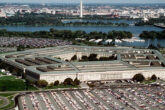April 19, 2017
Keeping Up Civ-Mil Relations
James Mattis was sworn in as secretary of defense in what is arguably one of the more fraught periods in civil-military relations in decades.
While civilian control in the United States is based on a solid foundation of history, doctrine, and tradition, civil-military relationships are above all human. And that means they are vulnerable to unrealistic or unmet expectations and perceptions. Simply put, tension invariably infuses these relationships — it’s merely a question of how much and in which way. As such, this relationship should expect strains, some demanding mitigation.
Nearly two decades of (inconclusive) war, serious lapses in the quality of support to our veterans, and a destabilizing budget roller coaster have been some of the major stressors. These are bracketed by a growing disconnect between those who serve, the civilian population, and emerging political factors. A particularly tumultuous election with unprecedented veteran and general officer partisan participation did not stop or mitigate threats of purges of general officers by the Trump campaign. Despite such anti-military rhetoric, Trump eventually faced suspicion that his cabinet was overly militarized and went to bat in support of a waiver for Mattis’s own confirmation. These events, along with an expected, but nonetheless toxic, increase in friction between military and civilian staffs at the Pentagon set the stage for Mattis’ arrival at the River Entrance a few short months ago.
Read the full article at War on the Rocks.
More from CNAS
-
The Department of Defense’s Breakthrough Nuclear Moment Risks Slipping Away
Unless they act, the Department of Defense’s breakthrough nuclear moment may vanish before it really happens....
By Will Rogers
-
DEFAERO Strategy Series [Apr 09, 25] CNAS' Becca Wasser and Phil Sheers on Revitalizing the U.S. Defense Industrial Base
On this episode of the Defense & Aerospace Report Strategy Series, sponsored by General Atomics Aeronautical Systems, Becca Wasser and Phil Sheers of the Center for a New Amer...
By Becca Wasser & Philip Sheers
-
From Production Lines to Front Lines
Executive Summary The U.S. defense industrial base (DIB) is struggling to meet the demands of the current strategic environment—let alone prepare for a potential conflict agai...
By Becca Wasser & Philip Sheers
-
The Pentagon’s Endangered Brain Trust
In this environment, sound assessments of emerging threats and new ideas to counter them will be especially vital....
By Dr. Andrew Krepinevich, Jr.




